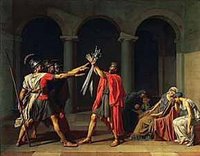"Sword and Sandal" movies (also called peplum movies) were really popular when I was growing up. They range very greatly in quality, but some of them show really well the lasting influence of the stories of Roman history. One of my favorites is Hero of Rome.
The film is set just after the expulsion of the Tarquins. The Etruscan leader Lars Porsenna has launched an effort to restore Tarquin the Proud to the throne. The "Mucius" you see at the beginning of the film earns the nick-name Scaevola (the left-handed) for reasons that will become apparent in the first 15 minutes of the film.
For extra credit, watch the first 15 minutes of the film--or the whole movie if you like. What do you see here that shows the importance of the stories of early Roman in turns of their influence on subsequent history?
Roman Keyline Blog 2025
Official Blog of History 422--Ancient Rome
Monday, August 25, 2025
Livy--Stories from Early Rome
 Please read the Preface and Book I of Livy's History of Rome). Read the preface carefully. Skim through Book I, concentrating on stories you find particularly interesting.
Please read the Preface and Book I of Livy's History of Rome). Read the preface carefully. Skim through Book I, concentrating on stories you find particularly interesting.Unfortunately, the formatting and arrangement of the online Livy history makes for tough reading. You might find it easier to look at the Baldwin project version of Livy. This are "retellings" of the stories, but close enough for our purposes. Just click on any of the first six links in the left hand column, and you'll get to a story you can easily read and comment on.
After you've done the reading, choose one (1) character from one of the Livy stories that you think particularly interesting. What parts of the story do you think really happened, and what parts do you disbelieve? Why? How is the story of this character important for understanding Roman history/subsequent history?
Monday, July 28, 2025
Welcome!
 Brek-ek-ek-ek-coax-coax... and welcome to Roman Keyline Blog! You have just crossed the river Styx and are ready to join Aeschylus and Euripides in a great line contest. Fortunately for you, you don't have to invent your own lines. Most of the time, I'll just ask you to pick out a great line from whatever Roman writer we happen to be studying in History 422 and explain why this line is key to understanding the whole work or particularly worth remembering and applying to real life.
Brek-ek-ek-ek-coax-coax... and welcome to Roman Keyline Blog! You have just crossed the river Styx and are ready to join Aeschylus and Euripides in a great line contest. Fortunately for you, you don't have to invent your own lines. Most of the time, I'll just ask you to pick out a great line from whatever Roman writer we happen to be studying in History 422 and explain why this line is key to understanding the whole work or particularly worth remembering and applying to real life.For this first post, you don't need to have done any of the readings. Just introduce yourself and explain why are taking this course.
Subscribe to:
Posts (Atom)
